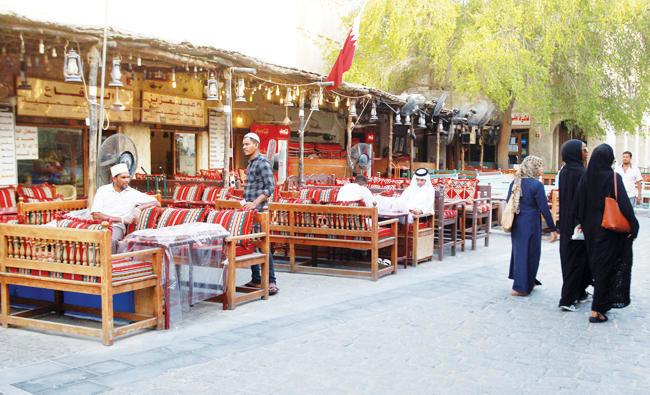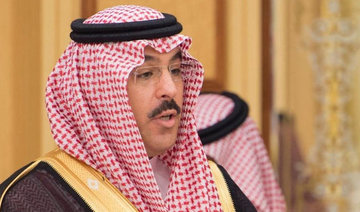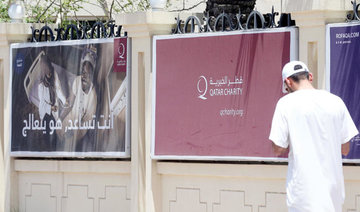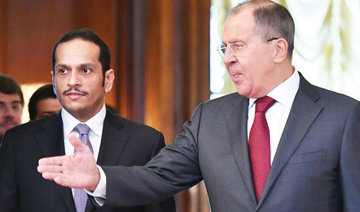JEDDAH: As the diplomatic crisis in the Gulf entered its seventh day with Doha failing to gain support from major world powers, Qatari Foreign Minister Sheikh Mohammed bin Abdulrahman Al-Thani visited Moscow Saturday.
But Russian Foreign Minister Sergei Lavrov took a neutral stand and called for dialogue to resolve the crisis. He said: “We cannot be happy in a situation when the relations between our partners are worsening. We are in favor of resolving any disagreements through... dialogue.”
Riyadh, meanwhile, stressed that an immediate change of policy by Qatar is essential.
“Fighting terrorism and extremism is no longer a choice, rather... a commitment requiring decisive and swift action to cut off all funding sources for terrorism regardless of its financier,” the Saudi Press Agency (SPA) cited an official source as saying.
Yousef Al-Otaiba, UAE ambassador to the US, told the official WAM news agency: “The next step is for Qatar to acknowledge these concerns and commit to reexamine its regional policies. This will provide the necessary basis for any discussions.”
Bahrain “stressed the necessity of Qatar’s commitment to correct its policies and to engage in a transparent manner in counter-terrorism efforts,” its official BNA news agency said.
Meanwhile, the EU is talking to all sides directly involved in the diplomatic crisis with two messages: Avoid any further escalation and engage in a political dialogue, in particular taking advantage of Kuwaiti mediation efforts, said a top EU official.
Turkish President Recep Tayyip Erdogan said he has never known Qatar to give support to terror organizations. “They declare foundations established to provide different services as terror organizations. Something like this should not happen. I know those foundations. Until today I have not witnessed Qatar give support to terror,” Erdogan said.
The Turkish leader called for the “blockade” against Doha to be “completely lifted,” urging Saudi Arabia to show leadership and encourage good relations in the region.
In another development, Qatar hired John Ashcroft, the US attorney general during the Sept. 11 attacks, as it seeks to rebut accusations from US President Donald Trump and its Arab neighbors that it supports terrorism.
— With AP, AFP, Reuters
Gulf leaders up pressure on Qatar; Russia calls for talks
Gulf leaders up pressure on Qatar; Russia calls for talks

Turkiye attacking Kurds in northern Syria will be dangerous, Iraqi FM tells Davos

DAVOS: Turkiye attacking Kurdish forces in northern Syria would be dangerous and would create more refugees in neighboring Iraq, said Fuad Hussein, Iraq’s foreign minister, at the World Economic Forum in Davos on Thursday.
Regional leaders discuss key Middle East issues at WEF

DAVOS: During the World Economic Forum, key Middle Eastern leaders addressed pressing regional issues, highlighting the importance of cooperation and political solutions for lasting peace.
Jordan's Foreign Minister, Ayman Al Safadi, emphasized the need for understanding the root causes of conflicts, particularly the October 7 incident, in order to prevent future violence. He reiterated Jordan's commitment to partnering with the US to promote peace in the Middle East.
Syria’s Foreign Minister, Asaad Hasan Al-Shaibani, voiced concerns about the impact of international sanctions, stating that their removal is crucial for Syria’s development and a better future for its people. He also called for greater support in advancing Syria’s political process.
Iraq's Foreign Minister, Fuad Hussein, warned that instability in northern Syria could lead to an influx of refugees into Iraq and jeopardize security, particularly with the potential release of thousands of terrorists from prisons in the region. He also expressed concern about the ongoing tensions between Tehran and Washington, urging both sides to pursue a diplomatic approach.
Jordan’s crown prince meets Bahrain, Kurdistan leaders in Davos

- Crown Prince Hussein seeks to boost cooperation in the region
- Joins session on artificial intelligence, global skills development
DUBAI: Representing King Abdullah at the World Economic Forum in Davos, Crown Prince Hussein bin Abdullah held meetings recently with regional leaders to reinforce Jordan’s commitment to fostering cooperation and addressing pressing challenges in the region.
The crown prince met with Sheikh Isa bin Salman Al-Khalifa, head of Bahrain’s delegation, to discuss ties between the two nations, according to reports.
Their talks focused on enhancing economic and technological cooperation and advancing training programs to help young people prepare for the workplace.
In addition, they reviewed regional developments, stressing the importance of sustaining the Gaza ceasefire and ensuring the delivery of humanitarian aid.
In a separate meeting with Kurdistan Regional Government Prime Minister Masrour Barzani, the discussions focused on relations between Jordan and Iraq.
The officials also spoke about boosting collaboration, especially in economic and technology fields, and addressing key regional issues.
The crown prince also participated in a session on enhancing the skills and productivity of people in the age of artificial intelligence.
The session addressed the WEF’s 2020 initiative to train 1 billion people globally by 2030, which is aimed at closing skill gaps and preparing workers for rapid technological advancements.
The participants at the 55th WEF, held under the theme “Cooperation for the Smart Age,” include heads of state, global CEOs and entrepreneurs, who have gathered to discuss strategies for growth, investing in people, and managing challenges in the energy sector and beyond.
The crown prince was accompanied by Deputy Prime Minister and Minister of Foreign Affairs and Expatriates Ayman Safadi, Jordan’s Ambassador to Switzerland Nawaf Al-Tal, and Director of the Office of the Crown Prince Dr. Zaid Al-Baqain.
Hundreds leave West Bank camp during Israeli raid: Palestinian official

- The Israeli military launched an operation in Jenin on Tuesday, saying it aims to uproot Palestinian militants in the camp and the city.
Jenin: A Palestinian official said hundreds of residents of the occupied West Bank’s Jenin refugee camp were leaving their homes Thursday, days into a large-scale Israeli raid in the area.
“Hundreds of camp residents have begun leaving after the Israeli army, using loudspeakers on drones and military vehicles, ordered them to evacuate the camp,” where Israel’s military launched an intense military operation this week, Jenin governor Kamal Abu Al-Rub told AFP.
The army told AFP that it was “unaware of any evacuation orders for residents in Jenin as of now.”
Salim Saadi, a Jenin resident who lives on the edge of the refugee camp, told AFP that the army had asked camp residents to leave between 9:00 am (0700 GMT) and 5:00 pm.
“There are dozens of camp residents who have begun to leave,” he said.
“The army is in front of my house. They could enter at any moment.”
The Israeli military launched an operation in Jenin on Tuesday, saying it aims to uproot Palestinian militants in the camp and the city.
The offensive began just days after a ceasefire deal paused fighting in the Gaza Strip.
The Israeli assault has killed at least 10 Palestinians and injured 40 more, according to the Ramallah-based Palestinian health ministry.
Israeli Prime Minister Benjamin Netanyahu said that “Operation Iron Wall,” as it has been dubbed, will “eradicate terrorism” in the West Bank city known as a bastion of Palestinian militancy.
Israeli army says killed two Palestinian militants in West Bank

- The Ramallah-based Palestinian health ministry said Israeli authorities had informed it of the deaths of Nazzal, 25, and Shalabi, 30
Ramallah: The Israeli military said Thursday it killed two Palestinian militants overnight near the occupied West Bank city of Jenin, where a large-scale raid is underway, accusing them of murdering three Israelis.
In a statement, the military said that Israeli forces found the two militants barricaded in a house in the village of Burqin.
“After an exchange of fire, they were eliminated by the forces,” it said, adding one soldier was injured in the exchange.
The military identified those killed as Mohammed Nazzal and Qutaiba Shalabi, accusing them of being “affiliated with Islamic Jihad” and responsible for a deadly shooting on an Israeli bus in early January.
The Ramallah-based Palestinian health ministry said Israeli authorities had informed it of the deaths of Nazzal, 25, and Shalabi, 30.
“The bodies are being withheld” by the army, it added in a statement.
Three Israelis were killed and six injured in a January 6 attack near the village of Al-Funduq, also in the West Bank.
Israel’s Defense Minister Israel Katz said at the time he had directed the military to “act with force” to find the attackers, vowing on X that “anyone who... enables or supports the murder and harm of Jews will pay a heavy price.”
The night that followed the attack saw several instances of violent altercations with settlers in that part of the West Bank, including in the village of Hajja, whose mayor told AFP it had come under attack.
Violence has surged throughout the occupied West Bank since the Gaza war erupted on October 7, 2023.
According to the Palestinian health ministry, Israeli troops or settlers have killed at least 850 Palestinians in the West Bank since the conflict began.
During the same period, at least 29 Israelis, including soldiers, have been killed in Palestinian attacks or Israeli military operations in the territory, according to Israeli official figures.












